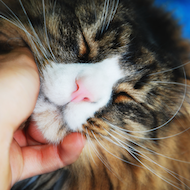Dieting cats 'more affectionate', owners say

Researchers said cat owners tend to anthropomorphise their pets and, as a result, are sometimes afraid to reduce their cat's food intake in case they become 'vindictive'.
Cat owners who took part in a recent diet study felt their obese felines became more affectionate during an eight-week diet. This is contrary to the fears of some owners that reducing food intake could prompt their cat to 'snub' them.
Scientists from Cornell University put 58 obese cats on one of three equicaloric diets - a high fibre (HiFi) diet, a control diet to maintain weight, or a low carbohydrate, high protein diet.
Owners recorded information about their cats' behavioural changes and their weights were compared to baseline at four and eight weeks.
Most owners reported an increase in begging behaviours, following, vocalising and pacing before feeding, while increased purring, sitting in owner's lap, resting and using the litter box were observed post-meal.
Writing in the Journal of Veterinary Behaviour, researchers said cat owners tend to anthropomorphise their pets and, as a result, are sometimes afraid to reduce their cat's food intake in case they become 'vindictive'.
But only two out of 41 cats in the study showed increased aggression towards their owners, and none of the cats began to urine mark.
Read the full study here: http://www.journalvetbehavior.com/article/S1558-7878%2815%2900194-X/pdf



 The veterinary mental health charity Vetlife is inviting the veterinary community to join it for a sponsored cold-water dip.
The veterinary mental health charity Vetlife is inviting the veterinary community to join it for a sponsored cold-water dip.